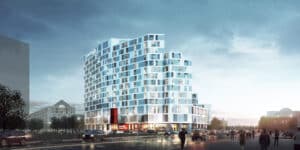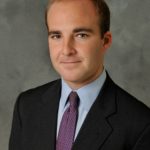
The Boston-Cambridge hotel market is set to absorb nearly 1,000 additional rooms in 2020, including the 411-room Hampton Inn/Homewood Suites at 660 Summer St. in Boston’s Seaport District. Image courtesy of Perkins + Will
Lodging demand in Boston and Cambridge, similar to the rest of the U.S., is expected to experience continued growth in line with the economy, however, increases to lodging supply will negatively impact occupancy and put downward pressure on pricing power.
This year will represent the U.S. lodging market’s 10th consecutive year of growth in revenue per available room (RevPAR), a metric used in the lodging industry to track performance of both occupancy and average daily rate (ADR). However, lodging markets across the country are no longer experiencing the levels of growth in revenue they once were, and the Boston market is no different. Pinnacle Advisory Group has projected the local market’s RevPAR to decline in 2019 and 2020.
Diminishing RevPAR Growth
As the economy rebounded from the housing crisis and subsequent downturn, the country’s RevPAR increased 6.9 percent, compounded annually, between 2010 and 2015. During these same six years, RevPAR in the Boston and Cambridge lodging market increased at a compound annual rate of 7.5 percent with three years of double-digit growth. According to STR, the country’s RevPAR growth slowed to approximately 3 percent in 2016 and remained at that level through 2018.
The Boston and Cambridge lodging market was negatively impacted in 2016 by a 4.7 percent increase to supply, a weak convention calendar, and a softening in corporate demand resulting in a slight decline in RevPAR. RevPAR then increased 3 percent and 2 percent in 2017 and 2018, respectively. The country’s RevPAR is expected to increase approximately 1 percent in 2019, while the Boston and Cambridge lodging market’s RevPAR will likely decline for the first time since 2016, the second in 10 years.
Boston and Cambridge in 2019
The RevPAR decline facing Boston and Cambridge this year is somewhat misleading as the market continues to experience growth in demand, approximately 1.9 percent increase in 2019. Eight hotels opened in 2019 representing approximately 1,400 new rooms, increasing the market’s supply approximately 3 percent. As a result, Pinnacle Advisory Group has projected the Boston market’s occupancy to decline from 82.7% in 2018 to 81.5 percent in 2019.
In addition to the increase in available rooms, other factors have negatively impacted year-over-year growth, including a decline in citywide events and convention center volume, which was down 24 percent.
This year is also without two fourth–quarter events which contributed to the success of 2018; the Red Sox’s World Series run and the Merrimack Valley gas explosions, which forced thousands of residents and workers to stay in hotels throughout Greater Boston. These elements have decreased the number of compression nights in the market this year and as a result have limited operators’ ability to drive rate growth.
With a decline in occupancy and projected ADR growth of less than 1 percent, RevPAR is expected to decline for the first time since 2016.
Market Adding Nearly 1,000 Rooms in 2020
Following its projected RevPAR decline in 2019, owners and operators in the Boston and Cambridge lodging market are bracing for much of the same in 2020.
Supply will increase over 4 percent in 2020 as the market welcomes almost 1,000 new rooms, almost all of which are mid-priced, branded hotels. An independent hotel, 907 Main, will open in Cambridge with 65 rooms. A 293-room Hyatt Place and a 411-room, dual–branded Hampton Inn/Homewood Suites will open in Boston’s Seaport District. The Hilton Garden Inn Logan Airport is expected to complete an 83-room expansion, and a 130-room Home2 will open at South Bay Plaza. The 4 percent increase to supply also accounts for the Ames Hotel closing in September of this year as well as the Langham Hotel which is currently closed for renovations.

Sebastian J. Colella
Demand growth will be driven by a 24 percent increase to convention center room night volume and four additional citywides. Although financial markets remain healthy, corporate demand is expected to soften slightly resulting from the negative impacts of macro-economic issues and the year’s election. Continued growth at Logan Airport, the ongoing development boom through Greater Boston, and the expanding office market, will help the market maintain an occupancy of 80 percent, a level it has exceeded since 2013. With a larger base of group demand on the books and an increase in compression nights expected, ADR growth is expected to surpass 2019 and increase 1.8 percent in 2020.
Despite uncertainties facing both the U.S. and the international economies, long-term prospects for the overall Boston lodging market are positive. Increases to supply will negatively impact occupancy and ADR both nationally and locally in the short-term, however statistics for the overall Boston/Cambridge lodging market are positive and illustrate the underlying strength of the broader market. The positive economic fundamentals of Boston, Cambridge and the overall area are expected to drive continued demand growth allowing Boston to remain one of the strongest lodging markets in the country.
Sebastian Colella is a vice president at Pinnacle Advisory Group in Boston.





